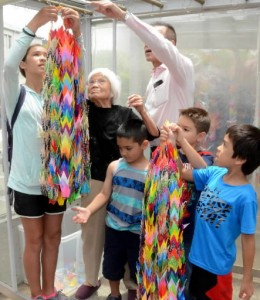Paper cranes connect A-bomb survivor and U.S. marines
Jul. 16, 2016
by Keiichi Nagayama, Staff Writer
On July 15, Kikuko Shinjo, 89, an A-bomb survivor and resident of Iwakuni City who has developed a friendly relationship with personnel at the U.S. Marine Corps Air Station Iwakuni, visited the Peace Memorial Park in Naka Ward, Hiroshima with 34 military personnel, civilian personnel, and their families, and dedicated their folded paper cranes to the Children’s Peace Monument. The event was organized in an attempt to have those living at the Iwakuni Marine Corps Air Station imagine the devastation in Hiroshima caused by the atomic bomb 71 years ago.
The members of the group first toured the Peace Memorial Museum and then visited the Children’s Peace Monument. Together with some children, Ms. Shinjo dedicated 1,000 paper cranes to the children who died as a consequence of the atomic bomb. Maria Abrecea, 47, who is the wife of an Iwakuni Marine Corps Air Station worker and came to Japan from the U.S. state of Illinois three months ago, said she learned for the first time that many children and unborn babies were exposed to the atomic bomb and that many people are still suffering from the bomb’s effects.
On August 6, 1945, Ms. Shinjo was a student in a nursing program at Yamaguchi Red Cross Hospital in Yamaguchi City. After the A-bomb attack, she provided care for many survivors who were brought to her hospital and was herself exposed to the bomb’s radiation while performing her duties. After World War II ended, she moved to Iwakuni and taught lessons in Japanese culture, such as flower arrangement and rice planting, at the Iwakuni Marine Corps Air Station. Last year, which marked the 70th anniversary of the atomic bombing, she began a new project that involved folding paper cranes, which are a symbol of peace. She said, “To rid the world of conflict, it’s important for people to communicate with one another. At the same time, I’d like to convey the fact that many children lost their lives to the atomic bomb.”
Because the idea that the atomic bombings were justified still prevails widely in the United States, Ms. Shinjo has not been able to share her experience with the American soldiers and their families. Still, she conveyed determination with the words, “Maybe those who visit Hiroshima will listen to my experience. I hope to tell them about it at the appropriate time.”
(Originally published on July 16, 2016)
On July 15, Kikuko Shinjo, 89, an A-bomb survivor and resident of Iwakuni City who has developed a friendly relationship with personnel at the U.S. Marine Corps Air Station Iwakuni, visited the Peace Memorial Park in Naka Ward, Hiroshima with 34 military personnel, civilian personnel, and their families, and dedicated their folded paper cranes to the Children’s Peace Monument. The event was organized in an attempt to have those living at the Iwakuni Marine Corps Air Station imagine the devastation in Hiroshima caused by the atomic bomb 71 years ago.
The members of the group first toured the Peace Memorial Museum and then visited the Children’s Peace Monument. Together with some children, Ms. Shinjo dedicated 1,000 paper cranes to the children who died as a consequence of the atomic bomb. Maria Abrecea, 47, who is the wife of an Iwakuni Marine Corps Air Station worker and came to Japan from the U.S. state of Illinois three months ago, said she learned for the first time that many children and unborn babies were exposed to the atomic bomb and that many people are still suffering from the bomb’s effects.
On August 6, 1945, Ms. Shinjo was a student in a nursing program at Yamaguchi Red Cross Hospital in Yamaguchi City. After the A-bomb attack, she provided care for many survivors who were brought to her hospital and was herself exposed to the bomb’s radiation while performing her duties. After World War II ended, she moved to Iwakuni and taught lessons in Japanese culture, such as flower arrangement and rice planting, at the Iwakuni Marine Corps Air Station. Last year, which marked the 70th anniversary of the atomic bombing, she began a new project that involved folding paper cranes, which are a symbol of peace. She said, “To rid the world of conflict, it’s important for people to communicate with one another. At the same time, I’d like to convey the fact that many children lost their lives to the atomic bomb.”
Because the idea that the atomic bombings were justified still prevails widely in the United States, Ms. Shinjo has not been able to share her experience with the American soldiers and their families. Still, she conveyed determination with the words, “Maybe those who visit Hiroshima will listen to my experience. I hope to tell them about it at the appropriate time.”
(Originally published on July 16, 2016)








